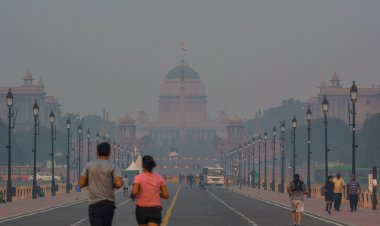How to Protect Yourself from Delhi’s Toxic Air: Practical Tips That Actually Work
Delhi’s air pollution is a year-round health crisis. Discover practical, science-backed tips to protect yourself and your family from toxic air in Delhi from indoor air hacks to lifestyle changes that really work.

Delhi’s air has become a silent killer. The toxic mix of dust, vehicle emissions, construction debris, and industrial waste has made it one of the most polluted capitals in the world. Every breath you take in Delhi comes with a health cost from irritation in your eyes to long-term lung damage.
But you don’t have to feel helpless. While fixing the larger pollution problem requires government and policy action, you can still protect yourself and your loved ones from its harmful effects with smart, science-backed lifestyle changes.
This article breaks down practical steps that actually work not just quick fixes or fear-based advice.
Understanding Delhi’s Air Pollution Crisis
Before learning how to protect yourself, it’s important to understand what makes Delhi’s air so toxic.
| Pollution Source | Description | Health Impact |
|---|---|---|
| Vehicle Emissions | Cars, bikes, trucks release nitrogen oxides and particulate matter (PM2.5/PM10) | Respiratory diseases, lung cancer |
| Construction Dust | Uncontrolled building activities release fine dust particles | Eye irritation, chronic cough |
| Industrial Waste | Factories emit sulfur dioxide and heavy metals | Asthma, heart diseases |
| Crop Burning (in nearby states) | Seasonal burning adds smoke and soot to Delhi’s air | Reduced visibility, increased PM2.5 levels |
| Household Waste & Open Burning | Burning garbage adds black carbon and toxins | Immediate breathing problems |
Delhi’s Air Quality Index (AQI) often crosses 300+, which is considered “hazardous.” That means the air you breathe daily can cause health issues even if you’re healthy.
1. Monitor the Air Quality Daily
The first step to protection is awareness. Delhi’s air quality can fluctuate dramatically within hours.
Use these free tools to stay informed:
-
SAFAR India App
-
IQAir or AirVisual App
-
Google’s built-in AQI feature (just search “Delhi AQI”)
When AQI crosses 200, it’s time to limit outdoor activities, especially jogging, cycling, or playing outside.
Pro Tip: Always plan your outdoor errands during early mornings or after rain when air tends to be slightly cleaner.
2. Wear the Right Mask (Not Just Any Mask)
A regular cloth mask won’t protect you from Delhi’s toxic air. You need masks designed to filter out fine particles like PM2.5 and PM10.
Best mask types:
-
N95 or N99 respirators: Block up to 95–99% of fine particles.
-
Activated carbon masks: Absorb harmful gases and odors.
-
Reusable pollution masks: Brands like Vogmask, Dettol ProShield, or Honeywell offer comfortable, long-lasting options.
Important: Replace your filters regularly. An old filter can trap more pollutants than it blocks.
3. Purify Your Indoor Air
You may not control Delhi’s outdoor air, but you can absolutely improve your indoor air quality where you spend most of your time.
Practical indoor protection hacks:
-
Invest in a HEPA air purifier.
Choose models with True HEPA filters that capture up to 99.97% of PM2.5. -
Seal leaks in doors and windows.
Use weatherstrips or rubber sealing to prevent polluted air from entering. -
Add indoor plants.
NASA recommends plants like Areca Palm, Peace Lily, and Snake Plant for their air-purifying abilities. -
Avoid incense sticks and smoking indoors.
They worsen air quality significantly.
Quick check: If your purifier’s filter turns grey within weeks it’s working. That’s the pollution it’s keeping out of your lungs.
4. Optimize Your Home Ventilation (The Smart Way)
Fresh air is important, but not when it’s toxic. The trick is to ventilate your home strategically.
Do this instead of keeping windows open all day:
-
Open windows for just 15–20 minutes during lower AQI hours (usually early morning after rain).
-
Use exhaust fans in kitchens and bathrooms to release indoor pollutants like cooking smoke and moisture.
-
If possible, install air purifying ventilators (APVs) that bring in filtered outdoor air.
This helps maintain a healthy oxygen balance without filling your home with dust and smog.
5. Strengthen Your Lungs and Immune System
You can’t stop breathing polluted air completely, but you can make your body more resilient to it.
Simple but powerful daily habits:
-
Stay hydrated: Drink at least 3 liters of water daily. It helps flush out toxins.
-
Eat antioxidant-rich foods: Include turmeric, spinach, oranges, and green tea they fight free radicals caused by pollution.
-
Practice deep breathing (Pranayama): Improves lung capacity and clears mucus buildup.
-
Quit smoking: Pollution + smoking = double lung damage.
Did you know? Studies show that people with stronger respiratory systems experience fewer pollution-related illnesses even in high AQI environments.
6. Use Natural Air Purifiers and DIY Solutions
If buying an electronic air purifier isn’t possible, don’t worry you can still make your home safer with low-cost natural alternatives.
Try these ideas:
-
Keep a bowl of activated charcoal or baking soda in rooms to absorb odors and toxins.
-
Make a DIY air purifying bag with activated bamboo charcoal.
-
Spray a mix of vinegar + lemon in rooms to neutralize indoor pollutants.
While these don’t replace HEPA purifiers, they significantly reduce volatile organic compounds (VOCs) and household toxins.
7. Avoid Peak Traffic and Construction Zones
Delhi’s pollution hotspots are usually traffic-heavy roads, construction sites, and industrial clusters.
If you must travel:
-
Use closed vehicles with air recirculation mode ON.
-
Avoid idling near exhaust-heavy areas (signals, tolls, metro construction sites).
-
Take alternative routes using pollution-mapping apps like Plume Labs or AQI Explorer.
Even a few kilometers’ detour can reduce your exposure by up to 30%.
8. Protect Children, Elderly, and Pets
Kids, elderly people, and pets are more sensitive to polluted air.
Special precautions:
-
Keep children indoors when AQI > 200.
-
Ensure they wear proper masks if they go outside.
-
Use air purifiers in kids’ rooms.
-
Wipe pets’ paws and fur after walks to remove settled pollutants.
Pets can absorb toxic particles through their fur and paws regular cleaning prevents indoor contamination.
9. Reduce Your Own Pollution Footprint
Protecting yourself is one thing but real change begins when you contribute to cleaner air.
Small but powerful steps:
-
Use public transport or carpool when possible.
-
Switch to electric vehicles or bicycles for short distances.
-
Reduce use of diesel generators at home.
-
Support plantation drives and eco-friendly policies.
Every single car off the road and every tree planted matters.
10. Get Regular Health Check-Ups
Even if you feel fine, pollution can silently harm your lungs, heart, and immune system over time.
Recommended check-ups:
-
Lung Function Test (Spirometry)
-
Blood oxygen level check
-
Chest X-ray (if you experience prolonged coughing or breathing issues)
Early detection can help prevent chronic diseases like bronchitis or asthma from worsening.
Table: Delhi Pollution Protection Summary
| Category | What You Can Do | Why It Works |
|---|---|---|
| Air Awareness | Check AQI daily, plan activities accordingly | Avoids high-exposure periods |
| Mask | Use N95/N99 respirators | Filters PM2.5 and harmful gases |
| Indoor Air | Use purifiers, plants, and seal leaks | Reduces indoor pollutant levels |
| Nutrition | Eat antioxidants and hydrate well | Builds body resistance |
| Mobility | Avoid traffic and open burning areas | Reduces direct exposure to exhaust |
| Community Action | Use clean transport, plant trees | Contributes to long-term improvement |
Conclusion
Delhi’s toxic air may be an unavoidable reality right now, but you don’t have to be its victim. With smart precautions from the right mask to better indoor air practices and conscious lifestyle habits you can protect yourself and your family.
Remember: Change starts with awareness and action. The cleaner Delhi you dream of begins with your own habits today.
FAQs
1. Which mask is best for Delhi’s pollution?
Use an N95 or N99 respirator that fits snugly over your nose and mouth. Avoid cloth or surgical masks as they can’t block fine PM2.5 particles.
2. Do air purifiers really work in Delhi?
Yes, especially models with True HEPA filters. They can remove up to 99.97% of airborne particles like dust, pollen, and PM2.5.
3. What foods help fight air pollution effects?
Foods rich in antioxidants like turmeric, amla, green tea, oranges, and leafy greens strengthen your immune system and help detoxify your body.
4. How can I check Delhi’s air quality easily?
Use apps like SAFAR India, AQICN, or IQAir for real-time AQI data and forecasts.
5. Can indoor plants really clean the air?
Yes, plants like Snake Plant, Spider Plant, and Peace Lily absorb toxins and improve oxygen levels, though they work best when combined with good ventilation and purifiers.















.jpg)
















